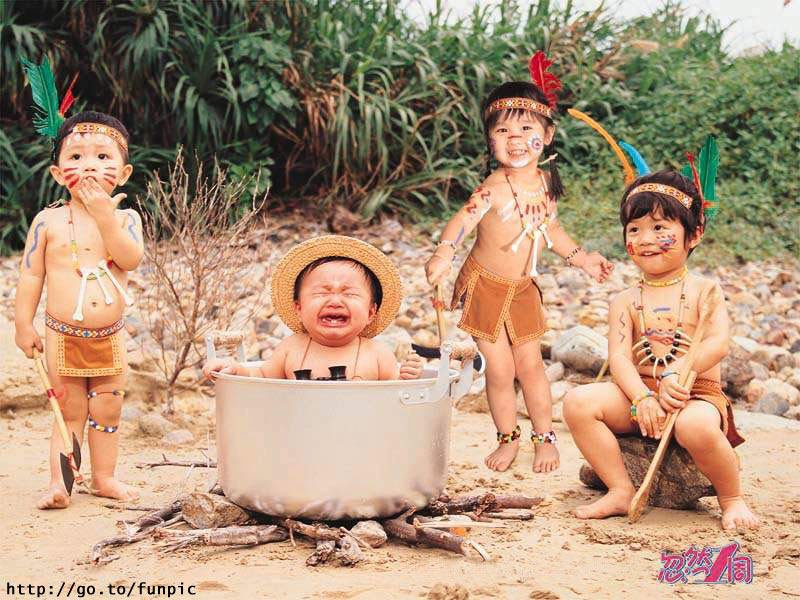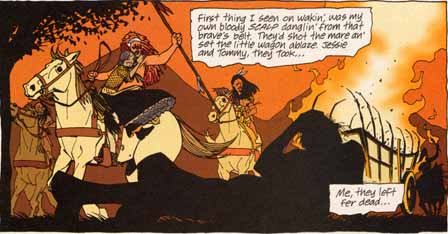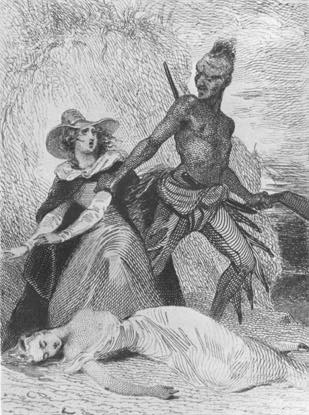 Another Stereotype of the Month entry:
Another Stereotype of the Month entry:
 Another Stereotype of the Month entry:
Another Stereotype of the Month entry:
As a teacher in Kashechewan, the author's idealized view of native communities was beset by a classroom of uncontrollable children, heirs to generations of neglect and a dying culture
Laurie Gough, National Post
Saturday, November 19, 2005
In recent days, the Canadian media has focused its collective gaze on Kashechewan, the tiny native community on the shores of James Bay in Ontario. Much has been made of the town's contaminated water, which has sickened hundreds of residents and forced many to be evacuated. But having lived and worked in Kashechewan, I can report that water problems are just the tip of the iceberg. In almost every respect, Kashechewan is a very sick place.
I am a teacher, a graduate of Nipissing Teachers' College in North Bay, where I took a specialization in native education. I chose Nipissing because I wanted to teach in a different culture than my own and because I'd always had an interest in native people and their history. But nothing I learned at Nipissing could prepare me for the realities of teaching natives on an impoverished reserve.
My experience in Kashechewan generated a complete unravelling of almost everything I believed. Until then, I romanticized Third World and native cultures. Unfairly, I put those people on a pedestal, somehow expecting them to be wiser than people from my own culture, more connected to the land, perhaps even possessing an ancient knowledge that our culture had lost eons ago.
When Kashechewan's band-run school offered me a job, I was thrilled, even though the job interview should have made me nervous. A man on the hiring committee asked me only one question: "What would you do if a kid in your class set something on fire?"
That first morning, I had everything prepared. I was going to have the children make name tags out of coloured paper in the shapes of various local animals — moose, geese, fish. On their desks I arranged crayons, glue, paper and scissors.
"Be firm but kind," I kept telling myself, as if I were the teacher on Little House on the Prairie, and an obedient group of timid children were about to enter the room. As I waited for 9 a.m., I looked over the list of names again: Elkanah, Zachariah, Malachai, Shem, Sue-Helen, Betty-Ann and Verna. How strange, I thought, this mix of biblical boys' names and all-American '50s girls' names on a fly-in, sub-Arctic reserve as far away from Israel and apple pie as one could get.
The bell rang, and my heart thudded as I rushed out to greet my new students. They weren't shy at all and looked me squarely in the eye. Later, I asked another teacher why some of my Third Grade students were so big. She told me some were 11 years old and had never been to school before.
The kids began bombarding me with questions — "What your name?" "Why you wear that?" and let me know where I stood — "Me hate school" and "Me go inside now." Before I could stop them, a storm of kids charged inside without me, shrieking, running, shoving and punching each other in the head.
Let me relate some highlights of that first morning: Dead animals were thrown around the classroom — mice, sparrows, small rats. At one point, something I thought was the tail of a mink torpedoed toward me. When the rusty-coloured object landed on my desk, I looked down in horror at the braid of my hair. I reached up to feel my newly cropped hairstyle. Somehow, during the chaos, one of the kids had put his or her scissors to use. The curtains were torn down and used as a giant hammock. Books were cut up, scribbled upon and chewed. Nothing I did to try to prevent any of this had any effect. I was a non-entity. Already I'd aged five years and lost my voice. My hands were shaking. It was 10 a.m. I'd "get used to it," the other teachers told me.
The other teachers were wrong. I never got used to it. It never got better. But at least I had the advantage of knowing that if I really wanted to I could escape that sad little ice village and join my own culture again. These children and their parents were caught in a no-man's land, lost between two worlds — one foreign, the other going extinct.
As time went by, I realized that very little native culture remains today in sub-Arctic Canada. Once, small bands of nomadic Cree roamed the territory, hunting, fishing and gathering. Today, most live in villages year-round in pre-fab houses, unemployed, on welfare and getting their highly processed food at the Hudson's Bay store. The vast quantities of sugar consumed daily by the kids is evident in their rotting teeth. Here and there, some of the old ways still exist: Twice a year, school is shut down for a week-long goose hunt. (The children were excellent goose callers, as they demonstrated daily in class.) But otherwise, it's simply a squalid imitation of the white man's world.
I was astounded by the discipline problems in the school — until I observed the cause: These children's lives weren't structured in the way of most children's lives in the south. Children are rarely told what to do or not to do. They may sleep at a different house every night. Meals are rarely eaten together as a family. When I would ask the kids what they had for lunch, Mars bars, Coke and potato chips were the usual replies.
Television, it seemed to me, was the main culprit in destroying what little the people had left of their culture. Within a year of the first TV's arrival in the village in the late 1980s, the nurses told me, children began to fight regularly and swear at the teachers — behaviour that had previously been rare. No longer were they content with their homemade toys; they wanted plastic guns instead.

In the times when the Cree embraced a traditional hunter-gatherer lifestyle, their ancestors' parenting methods would have worked. Allowing children to roam freely without rules helps them develop useful survival skills. But now that the people no longer hunt and gather to survive, this child-rearing method no longer works. Children typically become depressed and hostile by their early teens. The anger lasts into adulthood, where it's often accompanied by hatred toward all outsiders. Teachers would sometimes be pelted with rocks and snowballs as we walked down the road. Across the river, someone had hung the female principal's dog by a noose so it dangled dead on her front porch when she stepped out to work one morning.
Most parents were not the least bit interested in encouraging education or reading to their children. One reason, I had to remind myself, was that up until the 1960s, generations of parents had been taken away to residential schools at early ages. No wonder many of these adults had few parenting skills: They'd never had the chance to learn such skills from their own parents.
It was also evident that the very few who did manage to get away from the reserve to complete their educations rarely returned. This was understandable — but it meant the community had few educated, positive role models.
I dreaded going to work every day. The male principal of the school seemed to have permanently shut himself up in his office, even though most of the classes, mine especially, were completely out of control. Even among a problem school, my class stood out as especially bad. Twenty of my 29 students were boys. Every day in class, these boys performed wrestling manoeuvres on each other, which usually ended with a pile-up of all 20. The fattest boy, who weighed more than I did, waited to jump on at the end as he roared out an attack call. Not a day passed when I didn't see blood.
The day after Halloween, all the kids brought bags of candy to school, and one chubby girl ate so much that she defecated right there in the classroom. She was so enraged when the boys teased her about it that she reached into her underwear to remove the offending rank mass and began throwing it around the room. I distinctly recall the considerably large contents of her bowels splattering on the blackboard — way too close to where I was standing. All I could do was yell, "Hit the deck!" to warn the others, then hide under a desk myself. I figure that a kid who hurls her own feces at other children inside a classroom might be participating in an activity that even the worst problem kids in inner-city schools would consider unseemly.
Efforts to connect with the children through their culture produced dead ends. One day I tried some native drumming in my class. Some of the kids brought in drums, and we also made a few. Days later, a group of native elders came to tell me to stop the drumming because they didn't want "evil Indian ways against Jesus."
After three months, I began waking up with headaches and dark circles under my eyes. One day in class, I think it was the day when the kids had stolen my house keys — they regularly stole things, but I really needed those keys — I felt so defeated and exhausted that something in me simply gave up. I sat at my desk and watched bleary-eyed as they whirled around the room like dervishes, destroyed every remaining book and sprayed glue into each other's faces. I couldn't fight it anymore. In one last-ditch effort, I invited the parents into my class to help me, but none of them showed up.
When I left the job at Christmas, I was a different person. A few days after I returned to my hometown of Guelph, a woman I knew who saw me on the street looked at me aghast and asked what had happened, as if I was suffering from some incurable wasting disease. Other than my physical appearance, something else in me had changed. No longer was I a bright-eyed idealist yearning to live in a teepee and voice the virtues of native culture. I'd lost something essential on the reserve, perhaps faith in humankind.
I had gone to Kashechewan naively looking for a culture that no longer exists. Instead, I found abuse everywhere — of children, women, animals and even the land itself, supposedly the subject of so much cultural veneration. On the reserve, open sewage was emptied into the streams; garbage was thrown all over the place; and every year, on Dead Dog Day, stray dogs were shot and thrown into the river, turning the water an alarming, brilliant red.
I have no idea what the answers are. But I do know I came away with the feeling that somewhere along the line, a great injustice had been done to those kids. In time, they will turn into equally dysfunctional adults, never having had the chance to succeed and thrive in a healthy community.
© National Post 2005

A Native educator replies
"Anyone ever experience a Native classroom like this one?" I asked my correspondents. I received this reply:
I've taught at inner city schools with a mix of Native, Latino, Black, white, and Asian students, including some that were tagged by people both within and outside of them as "the worst" and "out of control". In my experience the fault always lay at the top, in the administration of the school. Even in the so called "worst" schools or classrooms, the troublemakers were maybe 10-20% of the students. Any determined teacher who can't learn to control his/her class after a week or so is simply not very good at teaching. The one big exception I'd make to that is when they are not being backed up by the administration.
And yes, I have seen things just as bad in the schools. I witnessed a female teacher threatened with rape by three freshman high school students. I've had students scream obscenities at the top of their lungs at me and known children taunted by other kids because of their smell, head lice, or unsanitary clothing. (At home some of them had no running water to bathe with. Some had parents who neglected to buy toilet paper, or teach them how to properly use it.)
That this teacher should scapegoat Native cultures is an example [of] pure racism at its worst. The problem is poverty, plain and simple. None of these examples are unique to any one group of people, any culture, any ethnicity. These kids may be uneducated but they are not stupid. They know when someone looks down on them for failing to live up to romanticized nonsense. A lot of Native people are rightfully hostile when facing someone who expects us to live up to Dances With Woves.
For petes sake, these were elementary schoolkids, and this teacher thought they should be "wiser...more connected to the land...posessing an ancient knowledge". This teacher is no better than someone expecting all their Black kids to be good basketball players. If he/she wants to look for blame, look in the mirror.
Al Carroll
Rob's comment
There's no way to tell if everything Gough wrote was true, partly true but grossly exaggerated, or false. But her essay defies the imagination—and the experience of others teaching on reservations. I've never seen a classroom report remotely like this one.
No experience is 100% negative and 0% positive. That's why I suspect a lot of stereotyping is going on. Gough has portrayed aboriginal children as savages and barbarians.
"Doc Blais" adds:
I did some search on Laurie Gough and found out that supposedly she taught at Kash over 10 years ago for one term, though she writes as if she were discussing a current situation.
Thanks. The National Post is rabidly conservative and anti-Indian, from what I've seen. No surprise that it would print such a negative screed.
Related links
Savage Indians
|
. . . |

|
All material © copyright its original owners, except where noted.
Original text and pictures © copyright 2007 by Robert Schmidt.
Copyrighted material is posted under the Fair Use provision of the Copyright Act,
which allows copying for nonprofit educational uses including criticism and commentary.
Comments sent to the publisher become the property of Blue Corn Comics
and may be used in other postings without permission.